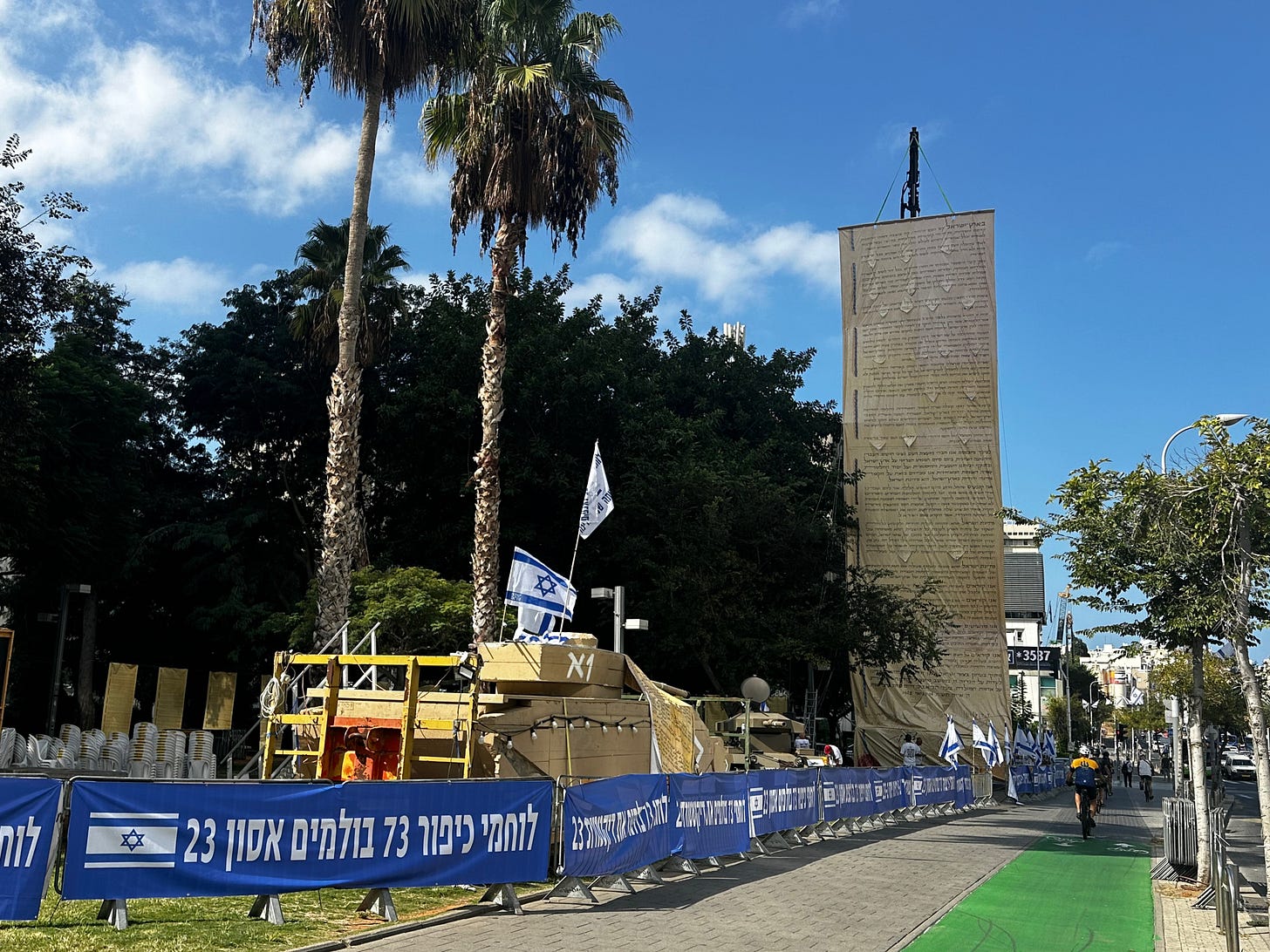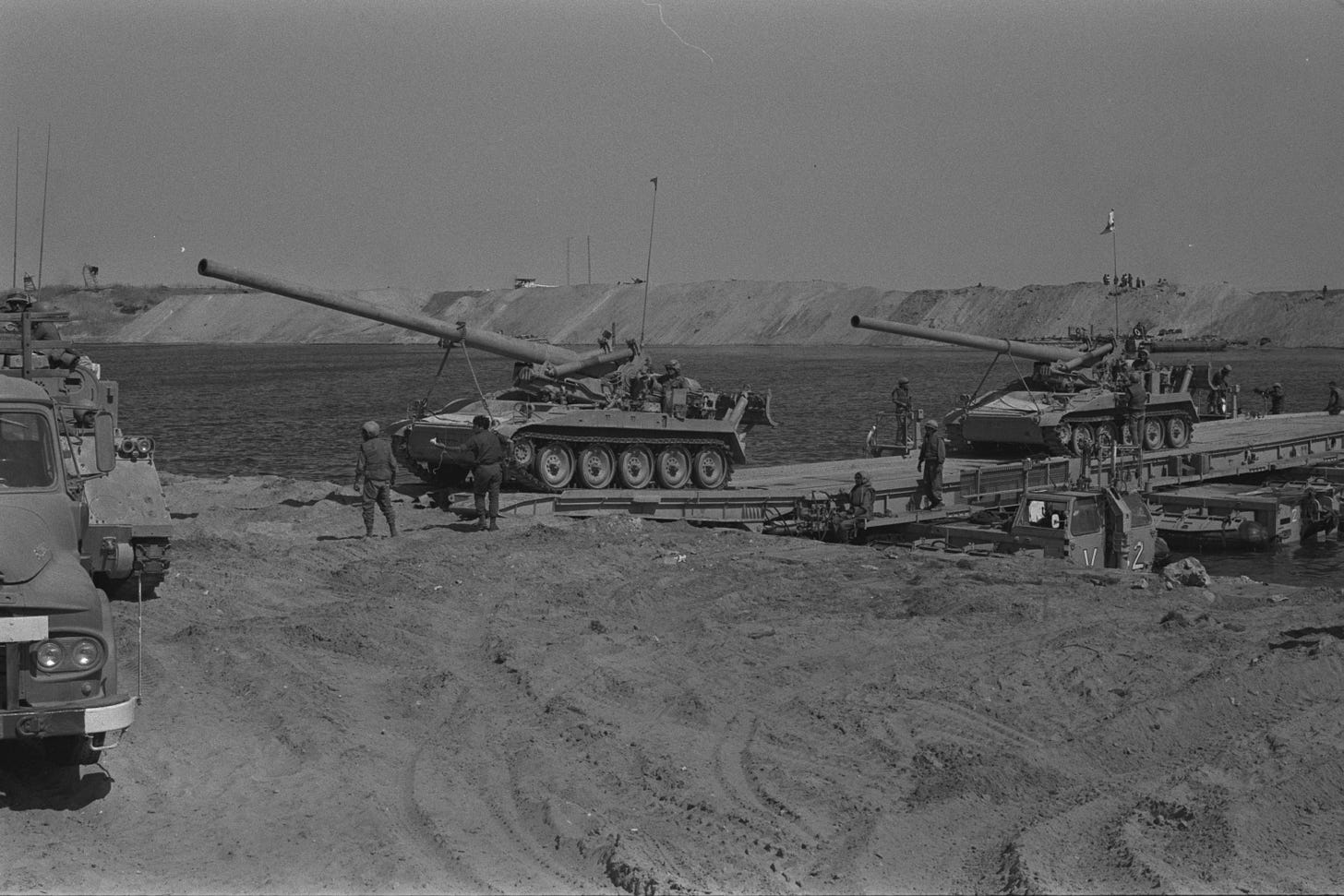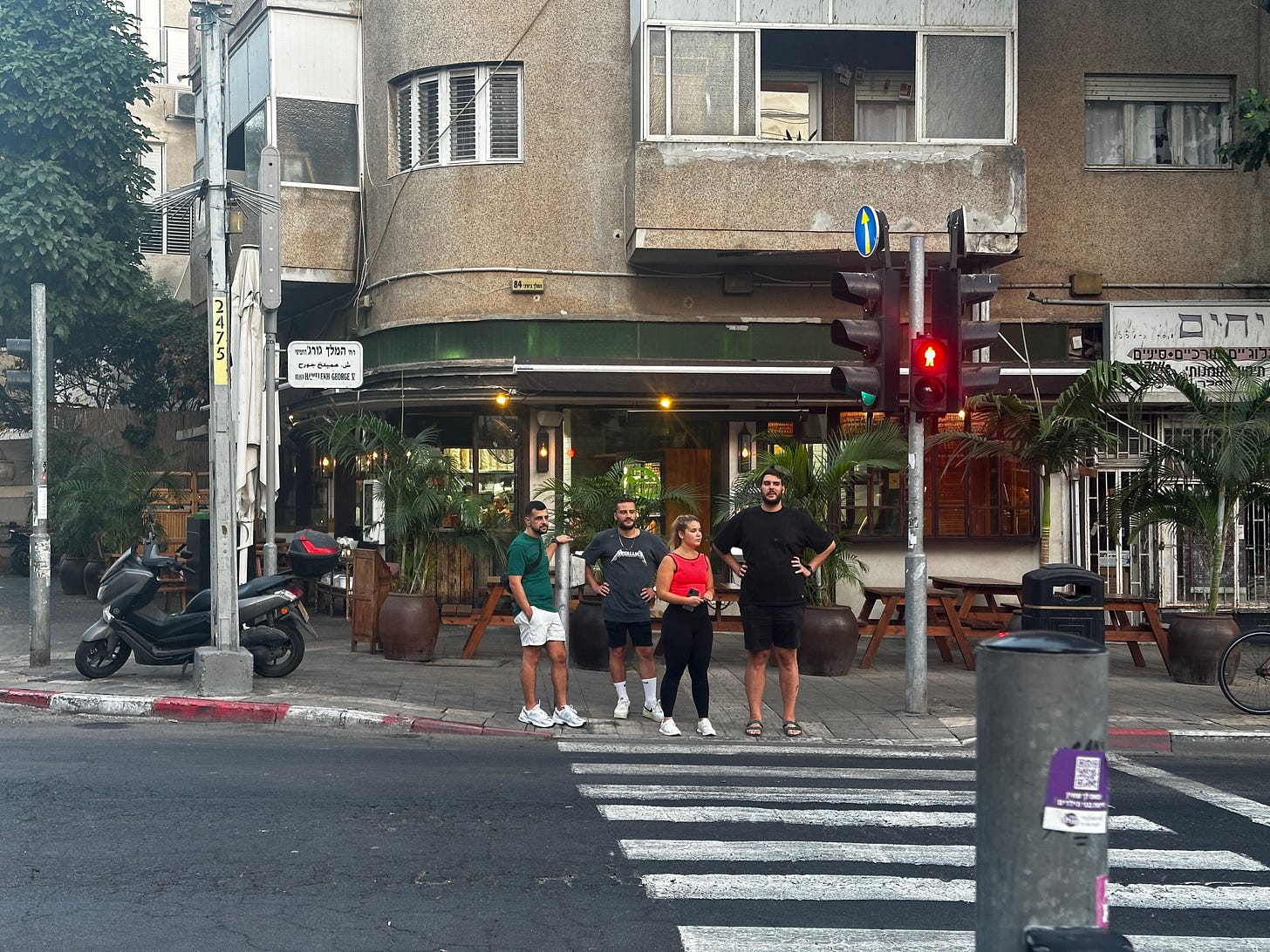Tel Aviv Diary October 6, 2023
50 Years Anniversary of the Yom Kippur War, Terror Continues, Spitting on Christians, Business, and a Restaurant Review
DEFENSE
On Tuesday, Israel reportedly launched airstrikes deep within Syrian territory. By Wednesday evening, Israeli forces had penetrated the refugee camp in Tulkarem to arrest a suspected terrorist. A skirmish ensued between Israeli forces and Palestinians in the camp. During the confrontation, Israeli troops hurled a fragmentation grenade at the Palestinians. However, it was promptly thrown back before detonation, resulting in injuries to five Israeli soldiers, two of whom are in critical condition. The IDF highlighted that last year, only 5% of terror attacks originated from Tulkarem residents; while this year, that statistic has surged to 20%. Additionally, on Wednesday night, two Palestinians opened fire on an Israeli motorcyclist in the Tekoah area. In a subsequent exchange of fire, the IDF neutralized both assailants.
TERROR IN HUWARRA
On Thursday, an Israeli car carrying a mother, father, and their year and a half old child was attacked in Huwarra, the father who was driving the car immediately understood what was happening and swerved to the lane of ongoing traffic and sped away saving the family. The attack, captured on video, led the IDF to quickly locate and neutralize the gunman responsible. In a symbolic move of defiance, settlers erected a sukkah in the heart of the town. Later that night, in an effort to enhance road security, the army declared its intention to shutter Palestinian shops along the Huwarra thoroughfare. Throughout most of the night there were clashes in the town between settlers and the army which was trying to keep the calm.
WHAT A ‘SHONDA’ (CAUSE FOR EMBARRASSMENT)
There has been a disturbing trend of Jewish religious youth spitting at priests and nuns, as well as desecrating Christian holy sites. Although, sadly, such behavior isn't new, recently its frequency appears to have surged. A few months ago, Yossi Eli, a journalist from Channel 13 posed undercover as a priest and documented multiple instances where he was spat upon, with one incident even involving a soldier. Though the police claimed to investigate these cases of hate crimes, concrete actions are yet to be seen.
This week saw a spike in such incidents, likely because many religious young people are not in school as they have been on break for Sukkot. In a particularly notable episode, during an event organized by the brother of Knesset Law Committee member MK Simcha Rothman, several students were filmed spitting on Christian clerics. These youths were subsequently arrested. However, the political response to this incident was alarming. One of the top advisors to Minister of National Security Ben-Gvir claimed that “spitting near a church was a longstanding Jewish tradition”. Ben-Gvir himself opined that such actions “weren't criminal”. These public declarations raise concerns about the effectiveness of Israel's public diplomacy (Hasbara) efforts when figures like Ben-Gvir can so quickly and repeatedly undermine attempts to foster positive relations with Israel.
CHIEF SEPHARDIC RABBI FOMENTS ANGER AMONG SECULAR ISRAELIS
This week, Israel’s Sephardic Chief Rabbi, Rav Yitzhak Yosef, (who receives his salary from the state) threw some more oil on the simmering fire between religious and the secular, when he stated that the mental faculties of secular Jews who eat unkosher food are ‘impaired,’ and therefore it is "difficult for them to comprehend things.” His comments were reported by Israel's Channel 13 on Sunday.
The rabbi added: “I observe everything happening within the secular community. They are in a state of jeopardy. They do not find satisfaction in life; everything is driven by the desires of this world.… They are poor souls … they are jealous of us. They see the Haredi sector, with its holidays and children, it is all jealousy," the Rabbi continued. "Their hate is developed from jealousy.”
REPERCUSSIONS FROM KIPPUR DISTURBANCES ON DIZENGOFF CIRCLE
Repercussions continue to arise from the Yom Kippur eve incident at Dizengoff Circle. The organization that hosted the prayer service with a mechitzah separation in the Circle — despite a court order requiring they refrain from doing so — had the permit to conduct its Simchat Torah celebrations at the site revoked. The “Rosh Yehudi” (Jewish Mindset) group sought redress in court, but were denied. Today, the organization and the city of Tel Aviv reached an agreement at the Supreme Court, under which their post Simchat Torah celebration will take place in a public space, but without separation by gender.
On Thursday, Rabbi Leo Dee, who tragically lost two family members in a terror attack earlier this year, took part in a modest Chol Hamoed Sukkot Shacharit service at Dizengoff Circle. At the conclusion of the service, claims were immediately made by others that Rabbi Dee had been attacked. Despite Rabbi Dee’s clear statement that he had not been attacked in any way, and that the worshippers had all finished the prayer peacefully, Prime Minister Netanyahu decried “the attack by protestors,” which the PM asserted “exceeded every limit.”
JUDICIAL OVERHAUL: WHAT’S NEXT?
As the Knesset gears up to reconvene post-holidays, there's an evident strategy to portray the protest movement against the judicial overhaul as anti-religious. Some right-wing proponents allege that religion is under attack. They hope such claims will weaken the protest movement, though the efficacy of that line of thinking remains doubtful. Last Saturday night demonstrations continued unabated.
POLICE
This past week another fight erupted between factions of Eritrean refugees, this time in Netanya. On Thursday night, a few hundred Eritrean women protested at Tel Aviv police headquarters for the failure of law enforcement to maintain order in the areas where they live. At the same time, the daily killings in the Arab Israeli community continue, with two women gunned down hours apart on Tuesday night.
Avi Biton, commander of the police’s coastal district announced that he saw himself as candidate for top cop. To make sure Minister Ben-Gvir appreciated him, Biton also stated that the recent rise in crime is due to all the resources police have had to allocate to the demonstrations throughout the country. The reality is that the police have been understaffed and undertrained for the last twenty years, at least, and the situation is deteriorating rapidly.
YOM KIPPUR, 50 YEARS AGO… AND TODAY
Today marks the 50th anniversary of the Yom Kippur War, which began on October 6, 1973. The significance of the war's impact on Israel cannot be overstated. A community leader in the US declared in his weekly newsletter that we should remember the "miracle" of the Yom Kippur War. However, that perspective feels far from accurate. In 1973, on Yom Kippur, Judaism's holiest day, Israel was taken by surprise. The eventual victory was hardly a miracle, but a hard-fought military triumph, paid for with the blood of those who were killed, and the countless others who were wounded. The Israel to which I immigrated a year post-war was deeply affected. The army I became a part of was in the midst of internalizing the lessons from that devastating war.
Many of the Yom Kippur war veterans, (mostly men now in their early 70s) are actively involved in the protest movement fighting to safeguard Israeli democracy. On Thursday evening, they organized a special demonstration against the government’s proposed judicial overhaul, advocating for the preservation of democratic values
.
ISRAELI WEAPONS TO AZERBAIJAN AND BEYOND
A week ago, Azerbaijan executed a swift attack on Nagorno-Karabakh, an area nominally part of Armenia. The offensive was successful, and within hours, Azerbaijan had secured complete control of the region. Azerbaijan's military has received significant support from Israel, which views Azerbaijan as a potential ally against Iran. In the weeks leading up to the attack, plane enthusiasts frequently documented flights departing from Israel’s Negev airbase, which is authorized to transport explosive cargo, heading to Azerbaijan.
These sales to Azerbaijan represent just a fraction of Israel's burgeoning defense industry exports. The Defense Ministry's approvals for drone sales to foreign countries increased by 40% in three years, expanding from 40 to 56 countries by 2022. Similarly, the number of countries importing munitions from Israel surged by 45 percent, growing from 42 to 61 nations. While training programs were only sold to two countries three years ago, they are now being provided to 17 countries. Furthermore, the distribution of cyber and intelligence systems expanded from 67 to 83 countries in 2022. Defense exports have long been a cornerstone of Israel's economy, tracing back to the international sales of the iconic Uzi submachine gun. Yet, today, the scale of these exports is truly staggering.
FINANCE
The Israeli shekels weakened this week to its weakest point in 7 years— 3.84 Shekels to the Dollar. Last year, a leader in the Israel’s banking industry asked me to write about the dangers of a shekel that was too strong and was hurting exports. That is clearly no longer a problem, instead a weaker shekel is causing additional price increases, in one of the already most costly places on earth.
The OECD released its annual report and recommendations for the Israeli economy. It lamented the fact that there seems no long term planning in Israel something we pay for dearly. It also recommended increasing educational expenditures in the Israeli Arab sector while cutting back funding in the Ultra Orthodox sector stating that that funding created disincentives to work.
BUSINESS
Stampi was able to secure $61 million in a series D led by Blackstone and included existing investors include: Bloomberg Beta, Insight Patterns, Signal fire, and Nextworld Capital. The company specializes in AI powered Accounts Payable automation. This brings the total capital raised by the Stampi to $148 million, to date.
A PIECE OF HISTORY— THE YOM KIPPUR WAR
During the spring and summer of 1973, several indicators suggested that the Egyptians and Syrians might be contemplating an attack on Israel. As late September and early October approached, these signs grew more frequent and pronounced. Notably, King Hussein of Jordan even undertook a covert trip to Israel to alert them about the impending attack. However, these warnings were largely dismissed by the head of Military Intelligence and other top officials. They firmly believed the Arabs wouldn't launch an assault until they achieved military equivalence.
Simultaneously, the Israeli Air Force (IAF) had gleaned insights from the War of Attrition. They were keenly aware of the formidable threat posed by Egyptian and Syrian Sam sites to their aerial superiority. In anticipation, the IAF formulated a detailed strategy to neutralize this threat, a mission that had to be executed before the Air Force could undertake other operations.
On the eve of Yom Kippur, October 5, 1973, the evidence pointing towards an imminent attack became overwhelmingly clear. Despite this, intelligence officials continued to downplay the likelihood of war. In response to the mounting threat, Israel's regular military forces were placed on high alert, just below wartime readiness, and the IAF discreetly mobilized its reserves. As dawn broke, fresh intelligence confirmed the looming conflict, suggesting it would commence by 5 PM. Consequently, on the morning of Yom Kippur, the Israeli government initiated an urgent reserve mobilization. The Israeli Defense Forces (IDF) proposed a preemptive strike against the Egyptian and Syrian air forces, but this was vetoed by Prime Minister Golda Meir over concerns about potentially jeopardizing American support.
The conflict erupted at 2 PM when an artillery salvo targeted Israeli positions along the Bar-Lev Line at the Suez Canal. Once the bombardment ceased, commando units made their move, landing both along the Canal and deeper into the Sinai. These units were quickly followed by troops who crossed the Canal in small boats. The Egyptians succeeded in seizing a majority of the Israeli posts on the Canal's eastern flank. Subsequent Israeli counterattacks were thwarted by the Egyptians, who employed anti-tank and anti-aircraft missiles.
However, the gravest threat emerged on the Syrian front. A breakthrough at the Golan Heights meant Syrian forces could potentially reach the Galilee within a day. The Syrians anticipated achieving this in 24 hours. The disparity in forces was stark.
On the morning of October 6, the Syrians had a massive advantage: 1,400 tanks to Israel's 177, 115 artillery batteries against Israel's 11, and 40,000 infantry compared to Israel's 200. Against these overwhelming odds, the Israeli defense at Golan lasted a harrowing 24 hours, during which they repelled the Syrians. The cost was high, with substantial territories in the Southern Golan being lost. Yet, by Sunday night, the first Israeli reserve tank division began arriving, staving off further advances and eventually turning the tide against the Syrians.
On the Egyptian front, Israel's first counteroffensive on the war's third day faltered. The IDF then assumed a defensive posture. But on October 14, the Egyptians launched a significant offensive, which the IDF repelled. Subsequent to a challenging engagement at the Chinese Farm, Israeli forces, under Ariel Sharon's command, crossed the Canal and encircled the third Egyptian army.
Recognizing the magnitude of Israel's counteroffensive, an immediate ceasefire was demanded. After a tense standoff between the U.S. and the Soviet Union, a truce was enforced on October 22. The Yom Kippur War extracted a heavy toll on Israel: over 2,000 fatalities and 10,000 injuries.
A TASTE OF TEL AVIV — NAM
RESTAURANT REVIEW, by Tali Schulman
Take a stroll down King George until you arrive at Zamenhof Street, and there, you'll discover “Nam”, a cherished gem among my favorite Asian restaurants in Tel Aviv. Nam's menu is a culinary treasure trove, featuring Thai classics like Pad Thai, various curries, and the refreshing Som Tom (Papaya Salad), among other delights. Despite its casual and efficient service, the quality remains uncompromising. Each dish bursts with freshness and exceptional flavors.
Among the menu's treasures, my favorites are the Yam Som-O, a herb-infused pomelo salad, accompanied by crispy fried fish during its seasonal availability. When it's not in season, that typically means it's time for my favorite dessert, the delicious mango sticky rice. Additionally, year-round, I love the Gang Knew Wan (green curry) and the Nam Tok (herb-infused steak salad). For those in search of a delightful and relaxed Asian dining experience, Nam is unquestionably one of my first recommendations!
For more Tel Aviv restaurant recommendations, you can find me on Instagram @talischulman where I save all my food adventures in my highlights!







